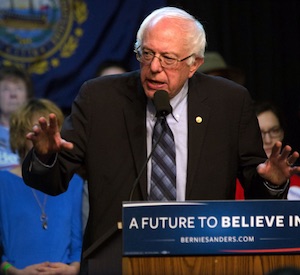 Bernie Sanders’ legion of supporters were outraged by the media’s decision on Monday evening to project Hillary Clinton the presumptive Democratic nominee, one day before polls opened in several late primary contests, including California, with its coveted 475 delegates.
Bernie Sanders’ legion of supporters were outraged by the media’s decision on Monday evening to project Hillary Clinton the presumptive Democratic nominee, one day before polls opened in several late primary contests, including California, with its coveted 475 delegates.
That projection, first reported by the Associate Press before quickly being snatched up by The New York Times, CNN, NBC and many others, drew waves of indignation from the blogosphere, where critics admonished these outlets for what they perceived to be a premature calculation of superdelegate votes, delegates who can change their vote anytime until the July convention in Philadelphia.
“Corporate Media Attempts Clinton Coup d’etat on Eve of Super Tuesday,” read financial news blog Wall Street On Parade. “Perfect End to Democratic Primary: Anonymous Superdelegates Declare Winner Through Media,” wrote famed journalist Glenn Greenwald for online publication The Intercept. “Why the media shouldn’t have declared Hillary Clinton the nominee last night,” wrote news site Vox.com. Some criticisms were more articulate than others, and others still came from parties with a predilection for conspiracy, many of whom are either willfully ignorant, or at least very bad with math, or simply don’t remember recent history or even understand how the political process works.
Did the media exhibit poor timing in projecting Clinton the presumptive nominee right before the CA primary? It’s debatable. The media cares about two things: getting the story right, and getting the story first (arguably, a veneration for the former has grown muted in recent years). In this case, all the AP did was tally up the pledged delegates won in primaries or caucuses, then interviewed hundreds of superdelegates and asked them who they’ll vote for at the convention, and finally, applied some simple math.
If you remember — it’s clear that many don’t — the same process was utilized to project Barack Obama the presumptive Democratic nominee all the way back on June 3, 2008, when a surge of superdeletes moved their support in his favor after a series of late primary wins. And when that superdelete-included projection came out, Obama still had several hundred fewer pledged delegates than Clinton has now and also held a narrower lead over Clinton than Clinton currently holds over Sanders. My memory could be fuzzy, but I don’t remember many Obama supporters complaining about that bit of good news eight years ago.
The argument goes, in the Sanders camp, that general election polls show Sanders beating Donald Trump by far wider margins than Clinton, and superdeletes, who will vote based on what they feel is right for the party and are left with the unencumbered freedom to swap their support for a candidate at any time, may be persuaded to vote for him based on this fact. Moreover, superdelegates residing in states where Sanders won that primary or caucus represent their constituents and thus, should follow their decisions at the ballot box, which, technically speaking, they have no obligation to do.
This desperate reliance on superdeletes to save Sanders’ campaign has been very funny, considering, if you’ll remember, that several months ago superdelegates were seen as a pariah to the Sanders camp, an undemocratic mechanism created by the establishment to override the people’s vote. Now that Sanders doesn’t have a chance of winning without them — and a nigh-zero chance that such a massive swing would occur — superdeletes are suddenly seen as a lifeline, a last-ditch effort to override the candidate who already received the most votes and pledged delegates.
Of course, this won’t happen. The Democratic National Committee is a private governing body. That doesn’t mean the club is rigged, but it would be disingenuous to deny that party loyalty is a feature of its machinations, and it's one reason why a surplus of the party’s superdelegates have favored the establishment candidate and not the candidate who was an independent until a year ago. I’m pretty sure Bernie knew this when he signed up with the ticket.
As someone who’s supported Bernie from the beginning, I’m certainly disappointed with the direction the Democratic contest has taken, but if there’s one positive achievement this mess of an election cycle has accomplished, it’s the fact that it has brought to light the terrible inefficiencies in the primary/caucus system as well as myriad problems in the DNC’s delegate selection process. Maybe we can do something about that.
In this sense, though Bernie might be on his way out, it deserves mentioning that he’s galvanized a movement that has turned a much-needed critical eye toward the election process. This isn’t say that more nuthouse cries of “fraud” anytime someone’s preferred candidate loses a state election is going to fix anything, and neither will complaining about the primary rules in your state that you didn’t bother to figure out before you went to vote for a nominee. Ideally, this entire ordeal will result in a better system and a more educated electorate next time.
Let’s just hope there is a next time.


 The ridiculously high prices Americans are paying at the supermarket might influence how—or if—they vote in November.
The ridiculously high prices Americans are paying at the supermarket might influence how—or if—they vote in November. At a moment in history when there are so many conflicts among peoples here and abroad, let us put our differences aside and celebrate this wonderful season in a spirit of togetherness.
At a moment in history when there are so many conflicts among peoples here and abroad, let us put our differences aside and celebrate this wonderful season in a spirit of togetherness. The news announcing the death of Henry Kissinger, the last of the prevaricating politicians and so-called statesmen who stole my future and that of thousands of other young Americans, got me thinking about Walter Cronkite.
The news announcing the death of Henry Kissinger, the last of the prevaricating politicians and so-called statesmen who stole my future and that of thousands of other young Americans, got me thinking about Walter Cronkite.


 Have a comment? Send it to
Have a comment? Send it to 
No comments have been submitted for this story yet.